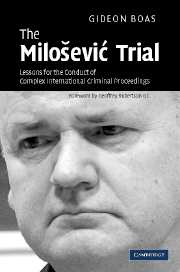Book contents
- Frontmatter
- Contents
- Foreword
- Preface
- Introduction
- 1 FAIR AND EXPEDITIOUS INTERNATIONAL CRIMINAL TRIALS
- 2 THE MILOŠEVIĆ PROSECUTION CASE – GETTING OFF ON THE WRONG FOOT
- 3 CASE MANAGEMENT CHALLENGES IN THE MILOŠEVIĆ TRIAL
- 4 REPRESENTATION AND RESOURCE ISSUES IN INTERNATIONAL CRIMINAL LAW
- 5 CONCLUSIONS
- Index
2 - THE MILOŠEVIĆ PROSECUTION CASE – GETTING OFF ON THE WRONG FOOT
Published online by Cambridge University Press: 18 February 2010
- Frontmatter
- Contents
- Foreword
- Preface
- Introduction
- 1 FAIR AND EXPEDITIOUS INTERNATIONAL CRIMINAL TRIALS
- 2 THE MILOŠEVIĆ PROSECUTION CASE – GETTING OFF ON THE WRONG FOOT
- 3 CASE MANAGEMENT CHALLENGES IN THE MILOŠEVIĆ TRIAL
- 4 REPRESENTATION AND RESOURCE ISSUES IN INTERNATIONAL CRIMINAL LAW
- 5 CONCLUSIONS
- Index
Summary
In the adversarial context of international criminal law, the role of the prosecution is extremely significant. It is the prosecution that conducts investigations, makes decisions about who to indict, and prepares the indictments which determine the scope and structure of the case. The purpose of this chapter is to examine the prosecution approach to the Milošević case, which will assist in determining criteria for best practice in the conduct of complex international criminal trials. Important strategic and policy areas of the prosecution case in Milošević were far from best practice, and seriously threatened the fair and expeditious trial framework within which international criminal trials are conducted. The prosecution approach to its case was zealous and overly expansive, creating a trial that was unmanageably complex and long. The factors which contributed to this are discussed, as are some of the considerations which motivated the prosecution to approach its case in this way. There are tensions and competing interests in the presentation of such a case, which encompass forensic, historical, political and sociological issues. The prosecution, while seeking in good faith to satisfy the interests it considered significant, made it impossible to conduct an expeditious trial and put at risk its fairness, requirements that are not only the responsibility of the court but also – to a lesser extent – the responsibility of a prosecutor in international criminal proceedings.
This chapter commences with an examination of the three indictments against the accused.
- Type
- Chapter
- Information
- The Milošević TrialLessons for the Conduct of Complex International Criminal Proceedings, pp. 79 - 130Publisher: Cambridge University PressPrint publication year: 2007



